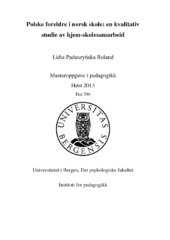| dc.contributor.author | Roland, Lidia | |
| dc.date.accessioned | 2014-01-02T09:52:37Z | |
| dc.date.available | 2014-01-02T09:52:37Z | |
| dc.date.issued | 2013-11-15 | eng |
| dc.date.submitted | 2013-11-15 | eng |
| dc.identifier.uri | https://hdl.handle.net/1956/7633 | |
| dc.description | Revised version: Spelling errors corrected | eng |
| dc.description.abstract | As a result of the EU expansion in 2004, a number of Polish labour-immigrants have migrated to Norway. Poles currently make up the largest group of immigrants in the country. In this thesis I have focused on collaboration between Polish parents and Norwegian schools. Based on the research question: how does the collaboration between Polish parents and Norwegian school work, viewed from both perspectives , I have carried out qualitative interviews with eight Polish parents and three teachers who work in a Norwegian primary school. Of the teachers, one is bilingual and two teach pupils attending an introduction class in Norwegian as a second language. The areas focused on in the study have been: the parents' knowledge concerning their rights and duties; the parents and the teachers` expectancies towards, and experiences regarding the cooperation, their understanding of a good cooperation," and the role played by language and culture in the cooperation. The findings have been discussed based on Bronfenbrenner's ecological theory of development and Bourdieu's concepts of capitals. The parents' insufficient language skills have been mentioned as the greatest obstacle to efficient communication. The concept of communication has been discussed in terms of Habermas' theory of communicative action. The analysis and the discussion of the descriptions given by the informants indicate that the parties are generally quite satisfied with the mutual cooperation. Both parties appear to trust and respect each other. The teachers appear to be culturally sensitive, but some of the parent informants report that they occasionally feel that the school has gone too far in guiding them in terms of child rearing. The informants have positive experiences with the direct communication, but some expect a more expanded use of interpreter service. The bilingual teacher plays an important role in the cooperation, especially at the early stage. The parents have to take in a lot of information, both written and unwritten rules, and the bilingual teacher acts as a bridge builder between the school and the parents. The school has to take the responsibility of informing the parents about both the school's expectations and the rights of the parents. It is also important that the school takes measures to ensure a higher level of equality in the interactions with the parents. | en_US |
| dc.description.abstract | I kjølvannet av EU-utvidelse i 2004 har det kommet mange polske arbeidsinnvandrere til Norge, og polakker er nå den største innvandrergruppen i landet. I denne oppgaven har det blitt rettet fokus mot samarbeid mellom polske foreldre og norsk skole. Med utgangspunkt i problemstillingen: ”hvordan fungerer samarbeidet mellom polske foreldre og norsk skole sett fra begge parters side,” ble det foretatt kvalitative intervju med åtte polske foreldre og tre lærere som jobber i norsk grunnskole (en tospråklig lærer og to lærere som underviser i innføringsklasse). Blant områdene studien har fokusert på har vært foreldrenes kjennskap til rettigheter og plikter, foreldrenes og lærernes forventninger til og erfaringer med samarbeidet, deres forståelse av ”et godt samarbeid,” samt rollen språk og kultur spiller i samarbeidet. Funnene ble diskutert med utgangspunkt i Bronfenbrenners økologiske utviklingsteori og Bourdieus kapitalbegrepene. Utilfredsstillende språkferdigheter hos foreldrene nevnes som det største hinder i kommunikasjonen. Kommunikasjonsbegrepet ble drøftet med utgangspunkt i Habermas’ teori om kommunikativ handling. Gjennom analyse og drøfting av informantenes beskrivelser har jeg fått indikasjoner på at de stort sett er fornøyde med det gjensidige samarbeidet. Partene synes å ha tillit til og respekt for hverandre. Lærerne oppleves som kultursensitive, men noen foreldreinformanter påpeker at skolen noen ganger har gått for langt i sin veiledning av foreldrene i forhold til oppdragelse. Informantene har positive erfaringer med den direkte kommunikasjonen, men noen etterlyser bredere tilbud om tolketjenesten. Den tospråklige læreren spiller en viktig rolle i samarbeidet med foreldrene, særlig den første tiden. Det er mye informasjon foreldrene må sette seg inn i, både skrevne og uskrevne regler, og den tospråklige lærer kan fungere som en brobygger mellom skolen og foreldrene. Skolen må ta ansvar for å informere foreldre både hva de forventer av dem og hvilke rettigheter de har. Det er også viktig at skolen etterstreber mer jevnbyrdighet i relasjoner med foreldre. | en_US |
| dc.format.extent | 1261873 bytes | eng |
| dc.format.mimetype | application/pdf | eng |
| dc.language.iso | nob | eng |
| dc.publisher | The University of Bergen | eng |
| dc.subject | Hjem-skolesamarbeid | eng |
| dc.subject | Polske innvandrere | eng |
| dc.subject | Polske foreldre | eng |
| dc.subject | Foreldresamarbeid | eng |
| dc.title | Polske foreldre i norsk skole: en kvalitativ studie av hjem-skolesamarbeid | eng |
| dc.type | Master thesis | |
| dc.rights.holder | Copyright the author. All rights reserved | |
| dc.description.degree | Master i Pedagogikk, IKT-basert | |
| dc.description.localcode | PED396 | |
| dc.description.localcode | MAPS-PEDIK | |
| dc.subject.nus | 724112 | eng |
| fs.subjectcode | PED396 | |
